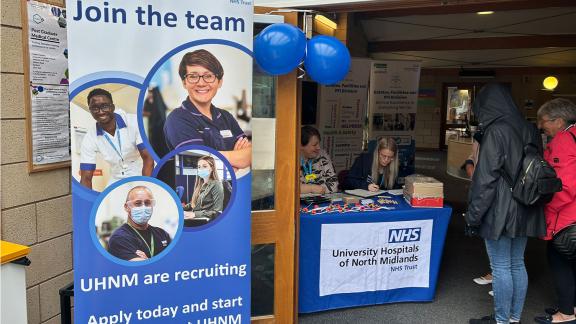Friends and family events fill domestic vacancies

Overview
The recruitment events streamlined the recruitment process by ensuring that multiple stages were completed on the same day, it saved money, the trust was able to provide immediate feedback to applicants and also generated positive staff morale.
Key benefits and outcomes
- All domestic vacancies have been filled.
- Time to hire for vacancies has decreased from 75 days to 48 days in one year to September 2023.
- Since introducing the recruitment days, the vacancy rate has decreased to the lowest rate in years.
- There are minimal costs associated with group recruitment events for both the applicant and the organisation.
- As the hiring process has been streamlined, the recruitment team have more time to focus on more complex hiring processes, and agency spend has been reduced.
What the organisation faced
The trust was struggling to recruit certain entry-level roles and realised it needed to rethink the application process. After feedback from applicants, it was clear that the application form was difficult for some people to complete. The form was not suitable for completing on smartphones, which was the device of choice for these roles. These barriers meant the trust was also missing out on attracting those from lower socio-economic backgrounds, which didn’t fit with its ethos of widening participation.
What the organisation did
Earlier in 2023, based on many vacancies in their domestic teams, the organisation decided to try a different approach to recruitment. It held a family and friends recruitment event, where current staff were able to signpost vacancies to friends and family members. In keeping with the idea of friends and families, it also printed off flyers which were posted on the streets in the area, as it considered recruiting locally to be an important aspect of being an anchor organisation in the area.
After advertising the event it held an in-person recruitment day, where interviews and offers were made on the same day. Staff were available to support the completion of starter paperwork, conducting ID and qualification checks upon successful application, and providing advice to those who were unsuccessful. From a recruitment perspective, this meant it only needed references and a DBS check to be processed prior to starting. The first event, held in summer 2023, had 70 attendees with 40 applicants appointed to role. The second event held in Autumn 2023, had 150 attendees, with another 47 applicants appointed. All domestic vacancies had been filled, prompting discussions on where else this recruitment approach could work.
‘I arrived at 07.45 on the day [Autumn 2023 event] to find there was already a queue outside the door of fifty or so people, we had a 09:00 start!’ – Emily Foxall, Recruitment Manager, UHNM
The trust is now keen to consider the same process for catering assistant roles, and potentially expanding this to admin and clerical staff in the future. It feels these pilot events have reinforced the need for a centralised approach, which is reflected in its healthcare support worker recruitment where applicants complete the traditional application from, but all attend on one day to do further paperwork and ID and qualification checks.
The event was hosted in an area of the hospital not used at weekends, and staff who ran the day were those who would normally work at weekends, meaning there is a low cost associated with these events. There were some small costs associated with purchasing snacks and drinks and printing leaflets, but otherwise costs were minimal. As many parts of the process were completed on the same day, those attending benefitted from less cost associated with travel, less childcare needed and face-to-face advice and guidance.
Take-away tips
- Focus on values-based recruitment, some applicants did not have the digital skills to complete a formal application but shone at interview as they showed they had strong practical skills and values aligned with those of the organisation.
- The friends and family ethos is important, but this can be expanded further to attract quality applicants. Applicants living locally, and applicants who were recommended by third-party organisations linked with UHNM, such as council run employment brokers offering free recruitment support and the JobCentre, which advertised the events to their clients leading to a wider pool of available candidates.
- Social media can reach audiences that would be otherwise inaccessible, for example local Facebook groups for job seekers and groups created for certain demographics.
- Employing staff members who already have a connection through family, friendship or the local area can have a positive impact on retention and staff morale.



